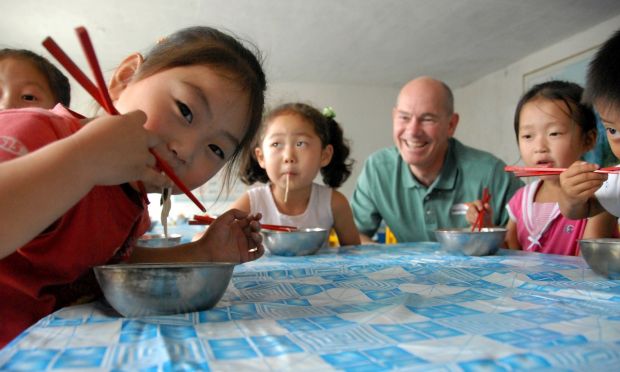North Korea: Daily bread - and noodles | World Vision International
ARTICLE • TUESDAY, SEPTEMBER 27TH 2011
North Korea: Daily bread - and noodles
AUTHORKevin JenkinsPresidentWorld Vision International
PRESIDENT'S PAGE

Hungry children don’t do so well at school – and, indeed, younger children may not go to school at all. With that in mind, World Vision has been helping communities to supplement pre-school children’s diets with bread, soy milk and noodles, most recently thanks to 60 metric tonnes of wheat flour imported from China.
Twenty-four-year-old Mrs Paek Myong-Sim has been running a bakery at Dochiri, North Hwanghae Province, for two years. World Vision helped set it up for one purpose – to supplement the diet of the youngest and most-vulnerable children.
“Before, the children didn’t get snacks at school, or bread at all,” she told me. “Thanks to the bread and soy milk the children have grown stronger at school. They are more interested in coming to the nursery and kindergarten, so the enrolment has gone up.”
The young children’s height and weight are routinely surveyed, and their body mass index is monitored to ensure each child is thriving.
“In this community, they are doing better than in others,” says Ministry of Agriculture deputy director Chun Myung-Chol. “This is a difficult period for food provision, so we are really grateful to World Vision for this contribution.”
Daily bread on an even larger scale comes to the children of Kaechon and Anju cities in South Pyongan Province. Here, World Vision built small noodle factories that provide children in pre-schools and kindergartens with a substantial meal.
Every day, 11 women produce 800 kgs of noodles to give lunch to 24,800 children aged under seven, who typically stay in 265 schools from 8am to 5pm while their parents work.
The noodles are made with fortified wheat flour, imported by World Vision from China, to which water and salt is added before the mixture is forced through a machine into the traditional strings. At the school, the dried product is boiled in water. In winter the children receive hot soup and in the summer cold soup. Cabbage or kimchi [traditional Korean pickled cabbage] is added. The result: almost every mother now sends her child to school.
This is the third in a four part series. Check back next week for a final glimpse into World Vision's work in North Korea from WVI President Kevin Jenkins.
No comments:
Post a Comment